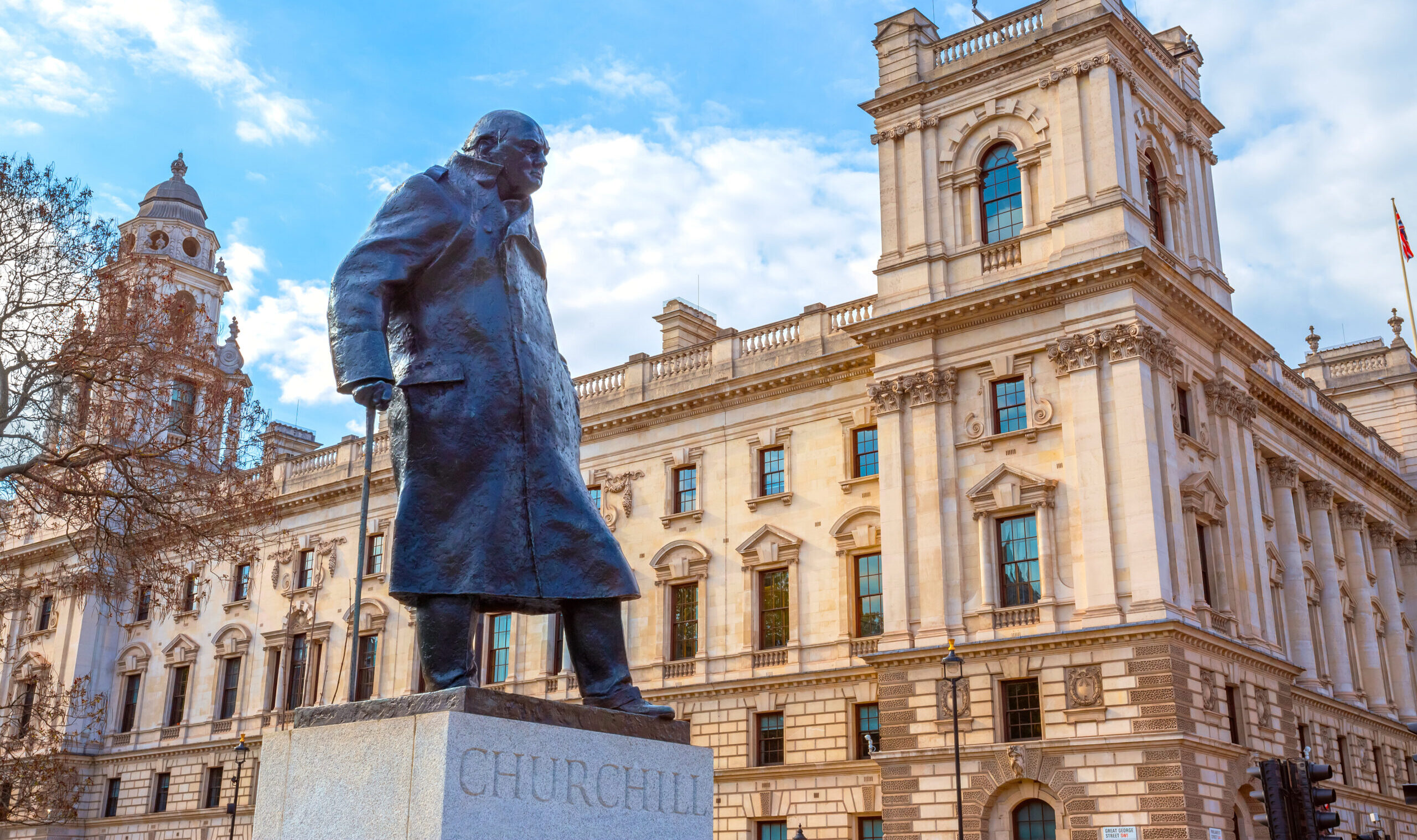Politics
Revisionism, just like the war itself, is inevitable, but one can do it without sounding like a complete crank.

An amateur historian—emphasis on “amateur”—made an assertion on a podcast that maybe Adolf Hitler wasn’t so bad after all, citing the Fuhrer’s stated desire for peace, and suggested that perhaps it was Winston Churchill who was the villain of the entire sorry episode.
That’s the story, and it should have ended there for me and my sanity, but it didn’t due to a combination of three factors: the fact that the episode occurred on Tucker Carlson’s show, the fact that we live in the age of midwit online amplification, and that unfortunate accident of being a historian and writer by trade, which compels me to listen and write about such things.
Historical revisionism is an intrinsic and necessary part of history; there have always been good revisionist historians offering a fresh lens on the past—as well as apologists and cranks with hairbrained theories based on cherry-picked anecdotes. It is indeed true that the Second World War has been mythologized into ahistorical nonsense; the myth serves the important purpose of policy-making, with “Hitler, Munich, and appeasement” used as a rhetorical cudgel to browbeat any proponent of a restrained foreign policy in particular and nationalism in general. So far, so good! Yet this “1619 project of the right” suffers from a minor but notable disadvantage. It is, and I use the term in a strictly clinical sense, retarded.
At the risk of oversimplification, there is basically one accepted consensus and three revisionist schools of Second World War historiography. The first is what we see: The war was the culmination of the greatest struggle of modernity, and was as simple as it comes. There was a clear evil side and a clear good side, and that’s that. The good side fought for liberty, and the evil side was tyrannical.
The problem with that idea is that it is not quite true, and is an effort of years of mythmaking. There are various evidences to the contrary.
Churchill was indeed a warmonger. He was also an imperial reactionary through and through and was a connoisseur of grandeur and civilization. He wasn’t that a great strategic thinker, as evident from his performance at Gallipoli. He was somewhat of a marginal figure in the British debates of the 1920s and 1930s, purely because Anglo-America felt betrayed by the Great War and the subsequent changes in the character of Britain, Europe, and America. Anglophone isolationism wasn’t a conspiracy or design; it was a natural instinctive reaction to the futile conflict of the 1910s, the destruction of European empires, and the birth of the Soviet communism, which together destroyed European civilization as well as European relative power permanently.
Neville Chamberlain was much more attuned to the British public than Churchill was, and to that detached, sea-faring conservative realism of the old that ran through Castlereagh, Canning, and Curzon, and ended with him; Churchill in effect killed true realist conservatism in Britain. Per the metrics of his own words, he couldn’t save the empire, which dissolved quickly after the war. Nor was he able to save the old world from the “fires of industry and perverted science.” What he did was prudently choose British subservience in a humiliating but workable and malleable American-led order, rather than an unworkable German-led order. Kinship and geography dictated that, not ideology or race.
The main revisionist school argues (rightly) that the Second World War was unnecessary, although they don’t go as far to say that Hitler was the good guy or that the war itself did not become inevitable. The founder of this particular magazine, as well as Peter Hitchens in Britain, are the most prominent living members of that tribe.
The second revisionist school offers straightforward Nazi apologia and a concurrent strain of Holocaust-denial. The first part of that equation is a moral rather than historical question. The second part of that equation fails the standards of richness, rigor, and evidence, not to mention of peer review, and is relegated to crankdom.
The Nazis were, more than anything else, modernists. They were, if not the same, similar to both liberals and communists—ideological cousins. The Second World War, above all, was primarily a war between three different and competing modes of modernity, all opposed to the old world of feudalism and faith. The older world and the older gods of localism, horse-drawn imperial carriages, and nature—Bilbo-Bagginsism—died in the industrial fires of Europe and the Pacific. The Nazis proposed euthanasia and not just eugenics. Runic and pagan symbolism wasn’t just an aesthetic affectation, nor was the Roman salute. It was the Nazis who experimented on human bodies without the consent of the victim. After the Nazis, the communists carried on all these lines of experimentation in their own sphere.
It was the old world of European Christendom that opposed both of those and took up arms against them. Guess who are the ones now bringing back both eugenics and euthanasia in civilized discourse under the garb of “science”? The one ideological cousin still standing as a victor over both communism and Nazism. It is the nature of things.
Historiography is always normative and never “objective.” The way we see Romans now, wasn’t how even Northern Europeans saw Romans in their heyday or immediately after. The Romans in turn considered anyone blond as unevolved barbarians. After the Reformation, however, Protestant Europe started looking at Catholic Rome as backward. The British imperials studied the governing philosophy and structure of the Christianized part of the Roman Empire, while the Euro-fascists glorified the brute force of the pagan Rome. Debates about the late British Empire or the Nazis are similarly a matter of time and narrative, given that the world is still living amid the smoking ruins of that empire, from parliamentary democracy to Palestine. With time and shifts in power, the normative lens will also shift. The world will also look at both the Nazis and the British Empire in very different ways in two, three, or five centuries’ time. That much is inevitable.
Thankfully, there is a smarter way of doing historical revisionism without sounding like a complete crank. A.J.P .Taylor’s Origin of the Second World War, as well as Hans Morgenthau’s Politics Among Nations, while attributing agency to the Nazis and imperial Japan, also argue that the war was an inevitable tragedy purely due to choices made after the First World War, from the Treaty of Versailles to the German reparations and the British choice to ditch Japan for the U.S.
One of the puzzles that they teach in any “good” undergraduate courses in international relations or history is why Britain waited till a German invasion of Poland to join the war. It had nothing to do with Nazi domestic politics. The British government knew what the Nazis truly were, just as the Americans knew what Japan was doing in China. The German annexation of other German-speaking territories in Austria and beyond made sense to Britain as a natural course-correction. But the two other major rationalist explanations of the delay were that Britain was buck-passing or buying time. Czechoslovakia was more liberal than Poland, but Britain refused the call to arms because, first, it wasn’t ready, but also, second, Poland and France still stood in the way of a German-dominated Europe. After Poland, the question was whether to support France, the last remaining major buffer power, or not. The choices, in short, were made for Britain.
In Churchill’s own recollection, the fundamental aim of British foreign policy from the dawn of nationhood was to foster a disunited Europe and deter the possibility of a European hegemon. Hitler’s genocidal mania notwithstanding, war would have happened with any expansionist power in the heart of Europe. The life of European Jewry or freedom and liberty had little to do with it. Same for America. The U.S., per Hans Morgenthau, had supported England purely for the same reason Britain supported France. The fall of the British Empire would have meant the Kriegsmarine in Canada, Japan controlling Australia, and Nazis having the entire production capacity and manpower of India under the Swastika.
For what it mattered, America didn’t voluntarily join the European war even after Pearl Harbor; it was forced to by Germany declaring war on the U.S. Even after joining, both Britain and the U.S. delayed opening a second front for over a year, leaving Stalin and Hitler to butcher each other. Whatever the war was, it wasn’t a moral crusade defending liberty against organized tyranny. It was, however, prudent, realist, necessary and to some extent, inevitable. Hitler, for his part, demonstrated his irrational and imbecilic side by taking on three giants—the British Empire, the U.S., and the USSR—alone. He simply didn’t think the Slavs equal to the Aryans, just as the Japanese initially did not consider the Americans martial enough. Dumb racial dogmas can influence policy-making in ways that often prove to be fatal in the long run.
Subscribe Today
Get daily emails in your inbox
Ultimately, the lesson is this. Discussions about Churchill and the Second World War, like Ronald Reagan on the right, have become a kabuki of orthodoxy such that the real gray areas are considered beyond debate. It’s all a Manichean struggle, and every effort is ordered toward defining current conflicts through those lenses. Naturally, in the absence of genuine debate about the realism and prudence of both Churchill and Reagan, ahistorical midwits come and fill the gap with their dumbest possible takes.
Churchill was a great Briton. He was objectively better than Hitler. He bought the free world time. All of that is true. But was he the greatest conservative or British leader, statesman, or politician? In the country of Drake, Castlereagh, Canning, Nelson, and Curzon?
Likewise, both the world wars were unnecessary but ultimately inevitable given the structural forces at play. Together they were, more than anything, a tragedy. Attributing agency to either side is fine, but making a monocausal interpretation of the war out of that agency is a moronic endeavor. But so long as the memory or the war is cynically cited to influence current foreign policy and stifle all scholarly dissent and revisionism within the halls of academia and civilized society, we shall see more such unfortunate ahistoricism in half-literate contrarian spaces.

